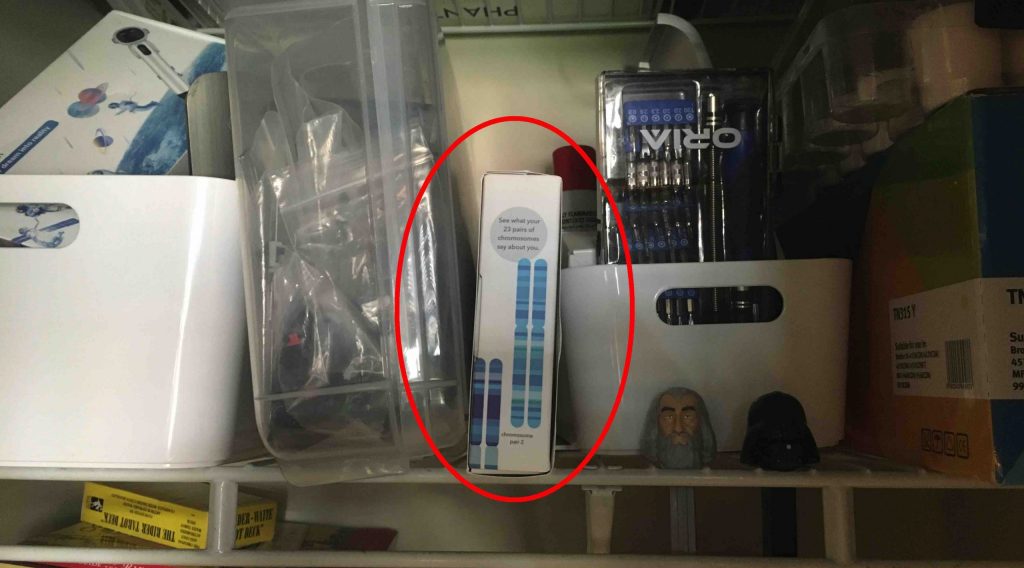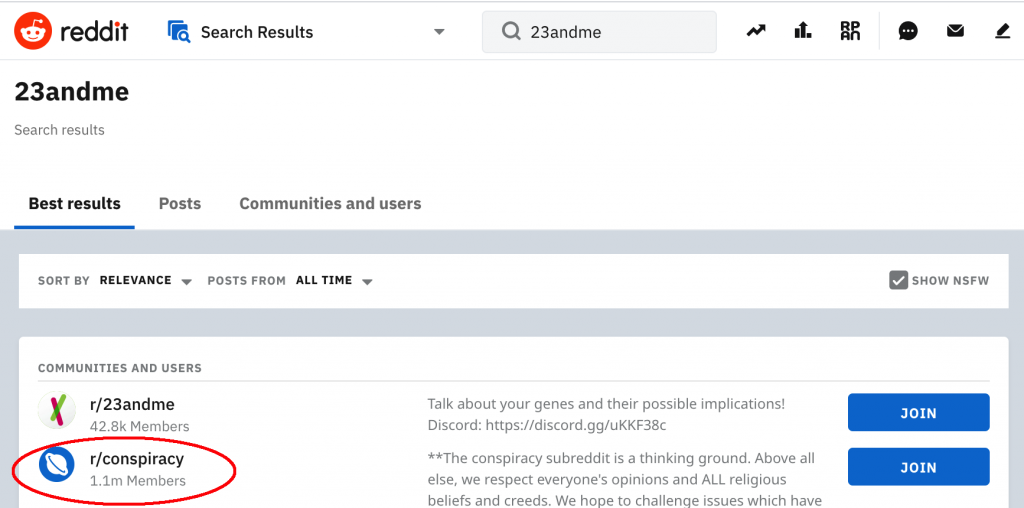
Here’s a picture of my closet.
Nestled between boxes, you will see a 23andMe home DNA test kit.
I got it as a gift a few years ago but never sent in my spit.
Yesterday, I read that they are laying off 100 people.
Why? The CEO said something like she was ‘surprised by growing privacy concerns.’
Has she not been listening to her Joe Rogan?
Every recent influencer story about DNA testing has gone something like this:
“DO NOT DO 23andME unless you want the very building blocks of your lifeforce and the exact disease that will kill you sent directly to the Mossad, Aetna, and posted on TicTok.”
Search for 23andMe on Reddit and the first subreddit you see recommended (after the company’s own page) is r/conspiracy.

In other words: there is a bit of public hysteria around DNA testing. (Side note: if you are interested being as anonymous as possible in your 23andMe test, this article will tell you exactly what to do).
23andMe has a related problem reaching beyond early adopters. Let me explain:
There are two types of people:
Early Adopters: “You mean, I spit in a tube, mail it to you, and find out if I’m 1/2,000th Cherokee? Sweet, let’s go!”
Everyone Else: “Hmm, I have some concerns about this. Can you tell me exactly how my information will be used? And what if I don’t want to know which horrific disease will kill me?”
This is a problem copy can fix.
One idea in the wonderful book Breakthrough Advertising is “market sophistication.”
This means that you MUST adjust your advertising message to the public zeitgeist about your product.
The most famous example of this is how cigarette companies changed their positioning as public opinion shifted.
“Lucky strikes are toasty!” became “Your doctor smokes Luckies!”
With this in mind, let’s look at what 23andMe could do here.
How can 23andMe fix its messaging in a more sophisticated market?
Here is a model of how one VPN company, NordVPN responded to a privacy scandal.
VPNs are networks you connect to so that your ISP will not be able to track what you are doing online. People use them to fool the network into letting them watch Hulu in a banned country or do Bittorrent.
Anyway, two years ago NordVPN was considered the gold standard of VPNs.
Then they got hacked.
They handled the initial response horribly.
Deny, deny, deny. The usual crap.
But they ended up admitting it and then radically changing their marketing. They did 2 things:
1. Security Messaging
Look at the NordVPN website. It’s like you’re entering a digital Swiss bank account. Every word of copy is about privacy and security. It’s in your face.
Now take a look at the 23andMe website.
The product is still positioned for the early adopter biohacker type:
“Health Happens Now”!
I bet the company thinks they are addressing privacy on their site with the little lock icon and a bullet point or two.
But this is not nearly enough. Tell them their info is stored on an offshore Peter Thiel data fortress — greedy insurance companies can’t touch it.
Let them get tested 100% anonymously. Make it more clear that they don’t need to know their disease info if they don’t want to.
In other words, do better at handling objections throughout the user experience.
2. Cut Pricing, Upsell More
This might be a tough pill to swallow. NordVPN had to cut pricing. They are now well below the other top VPNs in the market. But as soon as you sign up, you are bombarded with daily offers for related products. A password manager, more devices, and so on.
The cheapest 23andMe kit you can get now is $99. They should cut this to $50 or better $25, but make up the slack with an aggressive upsell flow (more data, test your whole family, personalized health plans).
I think the most you can spend with 23andMe today is around $750. This should be $5k or more.
Lowering the entry point will also address privacy concerns. The sad fact is that consumers care about privacy on a sliding scale. Closer to free means easier to swallow privacy concerns.
Change Your Messaging Along the Tech Adoption Curve
I posted an earlier version of this article in a group I’m in. Someone suggested 23andMe should charge more but justify it with better privacy.
This is not the way to go because tech prices want to drop as adoption goes up. There’s more computing power in the ham sandwich I just ate than my old Mac.
No, DNA testing, like all one-time revolutionary tech is going to go mass market and get cheap. But, like every product that’s gone from early adopter to mass market, the marketing will need to adapt as public opinion shifts and the old marketing gets stale.
Moral: If you’ve launched a tech product and the early adopters are starting to get tapped out, it’s time to take a hard look at your pricing and positioning as you move into the mass market. At the same time, give the bleeding edgers something even bloodier to buy.
Johny Ive-designed antimicrobial spit tube?
